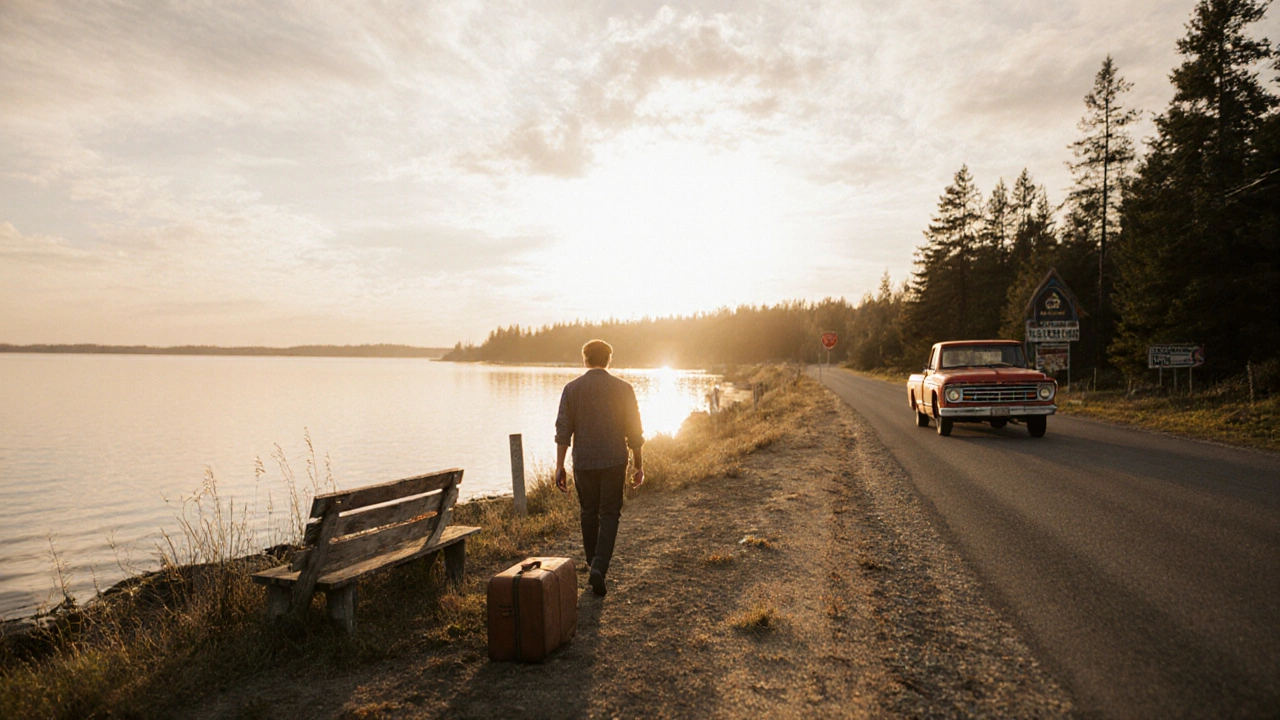Weekend Getaway Stress Relief Calculator
Calculate Your Stress Relief
Based on Toronto University's 2024 study showing 37% lower stress for regular weekend getaways.
Your Estimated Stress Reduction
Based on research: 37% stress reduction for regular weekend getaways
Forget two-week beach vacations and expensive international flights. The real vacation trend right now isn’t about going far-it’s about going quick. In 2025, weekend getaways have become the most popular way people recharge, and it’s not because they’re cheap-it’s because they work better.
Why Two Days Out of the Office Feels Like a Real Vacation
People used to think vacations needed at least five days to be worth it. That’s what the old rules said. But here’s what actually happens: after 48 hours away from your routine, your brain resets. You stop checking Slack. You stop thinking about the deadline. You start noticing the smell of pine trees, the sound of coffee brewing in a quiet kitchen, or the way sunlight hits your hotel window at 7 a.m. without an alarm.
A 2024 study from the University of Toronto’s Workplace Wellbeing Lab tracked 1,200 remote and hybrid workers. Those who took regular weekend getaways reported 37% lower stress levels and 52% higher focus when they returned to work-compared to people who only took one long vacation a year. The key? Consistency. It’s not about the length. It’s about the rhythm.
Where People Are Going (And Why It’s Not the Same Old Spots)
The secret isn’t just in the timing-it’s in the destination. People aren’t booking cabins in Muskoka or beach rentals in Florida anymore. They’re hunting for places that feel like escape, not just a change of scenery.
Take Port Dover, Ontario. A quiet lakeside town with a 1950s vibe, it’s now packed with weekenders from Toronto and Hamilton. Why? Because you can drive there in 90 minutes, sleep in a restored Victorian B&B, eat fresh perch at a family-run diner, and walk along a nearly empty beach at sunset. No crowds. No resort fees. Just quiet.
Same thing’s happening in places like Cobourg, Picton, and even small towns in Quebec like Knowlton. These aren’t tourist hotspots. They’re hidden pockets of calm. And they’re booked solid every Friday night.
The New Rules of Weekend Travel
If you’re still treating weekend getaways like mini vacations, you’re doing it wrong. Here’s what actually works now:
- Leave your phone behind-or at least in the hotel safe. The moment you check work email, the reset stops.
- Book early, but not too early. The best deals pop up on Wednesday afternoons. That’s when hotels release unsold rooms at 30% off.
- Go solo or with one other person. Groups of three or more turn it into a party, not a reset.
- Choose places with no Wi-Fi. Yes, really. If you can’t stream Netflix, you’ll actually look out the window.
- Plan nothing. Make a list of three things you want to do-but leave room for wandering. The best moments happen when you’re lost.

What You’re Really Buying: Time, Not Things
People used to measure vacations by how many attractions they checked off. Now, they measure them by how many hours they didn’t feel guilty for doing nothing.
One woman from Ottawa told me she spends $200 on a weekend in Prince Edward County. She sleeps in a farmhouse, walks through vineyards, reads on a porch, and eats cheese from a local shop. She doesn’t take a single photo. “I don’t need to prove I was there,” she said. “I just need to remember how it felt.”
That’s the real shift. Weekend getaways aren’t about Instagrammable moments. They’re about reclaiming your attention. In a world where your phone buzzes 200 times a day, two days without notifications is the closest thing to a digital detox.
How to Start Without Breaking the Bank
You don’t need a luxury resort or a fancy rental. Here’s how to make it happen for under $300:
- Use Airbnb’s “Nearby” filter-search for places within 2 hours of your city. You’ll find hidden gems with no reviews yet.
- Call small hotels directly. They often have last-minute discounts you won’t find online.
- Pack your own food. A sandwich, fruit, and coffee from a local bakery costs less than a restaurant breakfast and tastes better.
- Go midweek. Friday and Saturday nights are expensive. Book Thursday and Sunday to save 40%.
One man from London, Ontario, takes a Friday afternoon off every month. He drives to a cabin near Lake Simcoe. He brings his guitar, a book, and his dog. He doesn’t tell anyone where he’s going. “It’s my reset button,” he says. “I come back calmer. And I don’t need therapy.”
Why This Trend Isn’t Going Away
Companies are starting to notice. More employers are offering “micro-vacation” stipends-$100 to $200 per quarter just for short trips. Some are even encouraging employees to take a Friday off every other month.
Why? Because burnout is costing them more than vacation budgets. People who take regular short breaks are 29% more productive, according to Harvard Business Review. And they stay longer at their jobs.
This isn’t a fad. It’s a new normal. The future of travel isn’t bigger, faster, or farther. It’s quieter, slower, and closer to home.
What Happens When You Don’t Take One
Think you can skip it? You’re not alone. Most people say they’ll “just relax at home.” But here’s what usually happens:
- You scroll through Instagram and see someone else’s perfect getaway.
- You feel guilty for not doing anything.
- You end up doing chores, answering emails, or watching Netflix until midnight.
- You wake up Monday feeling worse than you did Friday.
Staying home doesn’t reset you. It just stretches the same stress over a longer period.
Going somewhere-even for 48 hours-forces your brain to switch modes. Your body believes you’re on vacation. That’s the magic.
Where to Start This Weekend
Here are five real places under 2 hours from Toronto that are quiet, affordable, and perfect for a reset:
- Port Dover, ON - Lakeside charm, quiet beaches, fish tacos at The Fish Market.
- Prince Edward County, ON - Wineries, art galleries, and farm-to-table dinners.
- Algonquin Park Gateway (Kawartha Lakes) - Forest trails, canoe rentals, no cell service.
- Knowlton, QC - Quaint village, cozy B&Bs, walking paths along the Brome Lake.
- Belleville, ON - Historic downtown, the Hastings County Museum, and a great burger at The Old Mill.
Book a room tonight. Leave your laptop at home. And don’t check your email until Monday.
Are weekend getaways really worth it if I’m only gone for two days?
Yes-more than you think. Research shows that even 48 hours away from your daily environment reduces cortisol levels and improves sleep quality. The key isn’t duration; it’s psychological distance. When you physically leave your routine, your brain stops thinking about work, chores, and stress. That’s what restores you.
What’s the cheapest way to do a weekend getaway?
Drive to a nearby town and book a basic room at a small hotel or B&B. Pack your own meals. Skip attractions. Focus on walking, reading, and being quiet. You can do it for under $200, including gas. The goal isn’t luxury-it’s peace.
Should I go alone or with someone?
Either works-but keep it small. One other person is ideal. Too many people turn it into a social event. Going alone gives you space to think. Going with one person lets you reconnect without distractions. Avoid groups of three or more unless you’re all there to unplug together.
Do I need to plan activities?
No. In fact, planning too much kills the vibe. Pick one or two things you’d like to do-like a hike or a coffee shop-but leave the rest open. Some of the best moments happen when you wander without a map. The goal is to be present, not productive.
What if I can’t afford to travel?
You don’t need to travel far. Try a “staycation” with rules: stay out of your house for 12 hours. Go to a park, library, or museum. Eat lunch somewhere new. Turn off your phone. Sleep in a different room. The point isn’t the location-it’s the break from your usual patterns. Even a single day of intentional change can reset your mind.
What Comes Next
Next time you feel overwhelmed, don’t wait for a “perfect” vacation. Don’t wait until you have two weeks off. Don’t wait until you can afford a flight to Europe.
Book a room for Friday night. Pack a book. Leave your laptop. Drive somewhere quiet. And let yourself just be.
That’s the secret. It’s not a trend. It’s a return to what humans have always needed: space, silence, and stillness.
